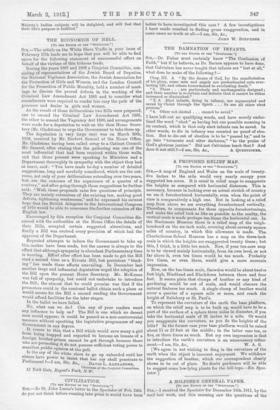THE ECONOMICS OF HELL.
[To THE EDITOR OP rug "SPECTATOR:1
Sin,—The article on the White Slave Traffic in your issue of February 17th leads me to hope that you will be able to find space for • the following statement of unsuccessful effort on behalf of the victims of this hideous trade.
During the years 1907 and 1908 a Conjoint Committee, con- sisting of representatives of the Jewish Board of Deputies, the National Vigilance Association, the Jewish Association for the Protection of Girls and Women, and the London Council for the Promotion of Public Morality, held a number of meet- ings to discUss the proved defects in the working of the Criminal Law Amendment Act 1885 and to consider what amendments were required to render less easy the path of the procurer and dealer in girls and women.
As the result of those deliberations two Bills were prepared, one to amend the Criminal Law Amendment Act 1885, the other to amend the Vagrancy Act 1898, and arrangements were made for a deputation to wait on the then Home Secre- tary (Mr. Gladstone) to urge the Government to take them up. The deputation (a vary largo one) was on March 30th, 1909, received by Mr. Herbert Samuel at the Home Office, Mr. Gladstone having been called away to a Cabinet Council. Mr. Samuel, after stating that the gathering was one of the most influential that had been received within those walls, and that those present were speaking to Ministers and a Department thoroughly in sympathy with the object they had at heart, said : "You have made to-day a number of detailed suggestions, long and carefully considered, which are the out- come, not only of your deliberations extending over two years, but are the outcome of the experience of a quarter of a century," and after going through those suggestions he further said: "Well, these proposals raise few questions of principle. They are mainly extensions of the existing law, making good defects, tightening weaknesses," and he expressed his earnest hope that the British delegates to the International Congress of 1910 would be able to announce the further extension of the English law.
Encouraged by this reception the Conjoint Committee dis- cussed with the authorities at the Home Office the details of their Bills, accepted certain suggested alterations, and finally a Bill was evolved every provision of which had the approval of the Department.
Repeated attempts to induce the Government to take up this matter have been made, but the answer is always to the effect that although sympathy is abundant Parliamentary time is wanting. Effort after effort has been made to get the Bill read a second time as a Private Bill, but persistent "block- mg' has made these efforts unavailing. In December last another large and influential deputation urged the adoption of the Bill upon the present Home Secretary. Mr. McKenna was full of sympathy, but could not undertake to introduce the Bill; the utmost that he could promise was that if the promoters could in the sessional ballot obtain such a place as would secure for the Bill a second reading the Government would afford facilities for the later stages. In the ballot we have failed.
Sir, what can we do ? Can any of your readers exert any influence to help us The Bill is one which no decent man would oppose; it could be passed as a non-controversial measure without upsetting the legislative programme of any Government in any degree. It comes to this, that a Bill which would save many a girl from being trapped and exported to become an inmate of a foreign brothel-prison cannot be got through because those who are promoting it do not possess sufficient voting power to manifest public opinion at the poll. Is the cry of the white slave to go up unheeded until her sisters have power to insist that her cry shall penetrate to
Chairman of the Conjoint Committee. 1.1 York Gate, Regent's Park, N. W.










































 Previous page
Previous page